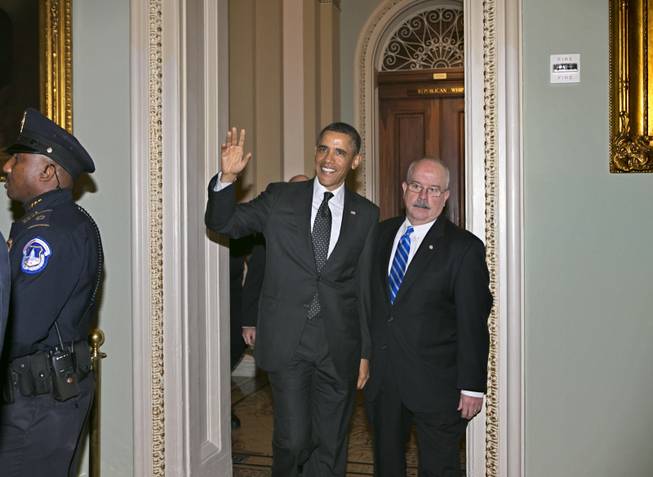
ASSOCIATED PRESS
President Barack Obama, escorted by Senate Sergeant at Arms Terry Gainer, waves as he arrives on Capitol Hill in Washington, Tuesday, March 12, 2013, to visit with Senate Democrats in the first of four meetings with lawmakers this week to discuss the budget.
Wednesday, March 13, 2013 | 12:10 a.m.
President Barack Obama began his week of congressional meetings among friends, huddling with Senate Democrats for over an hour during their regular weekly lunch to talk strategy as the country edges closer to the effective date for sequestration cuts later this month.
But as he tried to rally his team, not all players were completely in his corner.
“He said he hopes that we can reach some kind of grand bargain — and some responded with ‘Yes — but,’” said Iowa Sen. Tom Harkin, emerging from the meeting room off the Senate chamber. “What is in that grand bargain? We don’t want to start whacking away at Social Security or Medicare or things like that … so we’re cautioning him: Be careful about this grand bargain!”
Obama has been trying to strike a “grand bargain” on deficit reduction for almost two years now. But discussions between the president and House Speaker John Boehner have run aground every time they turn to balancing tax revenues and spending cuts, a combination Democrats say is imperative to a deal. But Republicans have resisted, maintaining cuts alone are a better solution.
“We need to reduce our deficit but we need to do it in a smart way,” Sen. Harry Reid said following the Democrats’ meeting with the president. “I don’t think there’s any way to negotiate when it’s one-sided negotiations.”
The division between the parties is not as cut-and-dry as it seems. While Republicans have categorically rejected offsetting the deficit by raising tax revenues in public, in private discussions, Boehner has in the past indicated willingness to balance cuts with revenues — though not the amount Democrats would like. But Boehner has had a difficult time selling those compromises — when he has made them — to the rank-and-file Republicans in the House.
There is also rumbling in the Democratic ranks about how far Obama has been willing to take the party position.
Obama has made repeated calls for entitlement reform to extend the lifespan of social safety net programs like Medicare and Medicaid. During the recent fiscal cliff crisis, reports emerged that Obama was signaling to Republicans that he would be willing to slow down the growth of cost-of-living adjustments to Social Security — angering several Democrats in the caucus.
“Here’s the issue: The president, in the past, in personal negotiations with Boehner … indicated that they would be willing to do certain things,” Reid said, congratulating Obama “for showing how nice he is, and knowledgeable” in discussing controversial entitlement reforms — and refusing to ascribe it any more significance than that.
“The Republicans never get further than that,” Reid continued. “They take these things that were talked about in abstract and say that’s what they [the White House] have agreed to. They haven’t agreed to any of that.”
While Reid and Obama have worked in close tandem on the parade of knock-down, drag-out budget fights Congress has contended with since summer of 2011, their roles are slightly divergent: While Obama’s chief concern is to broker a deal, Reid’s is also to deliver his caucus.
In the past, disagreements between Senate Democrats and Obama have been passing — they have backed the deals the president has struck in greater numbers than any other caucus or conference in Congress, and to date, have not staged anything near the public displays of mutiny Boehner has sometimes suffered at the hands of the House Republicans.
Tuesday’s listening session with Senate Democrats did not focus solely on deficit reduction, though the impending sequestration effective date of March 27, and this week’s release of opening budget proposals in the House and Senate did influence much of the discussion.
Senators who participated in the meeting said the president also commented or fielded questions on gun control, immigration and his use of drones — a sign that some Democrats, though they did not join in Republican Sen. Rand Paul’s 13-hour filibuster of since-confirmed Central Intelligence Agency director John Brennan, shared at least some of his concerns.
The president sits down with Boehner and members of the House Republican Conference early Wednesday afternoon, and on Thursday, meets with Senate Republicans and House Democrats in a congressional double-header.

Join the Discussion:
Check this out for a full explanation of our conversion to the LiveFyre commenting system and instructions on how to sign up for an account.
Full comments policy